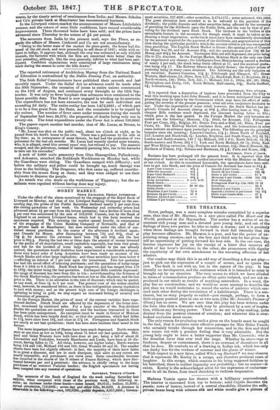THE THEATRES.
Never, perhaps, was a more complete mistake committed by a superior man, than that of Mr. Marston, in a new piece called The Heart and the World, produced at the Haymarket. The author has a notion of an in- constant rich young man and a devoted poor young lady, and out of the feelings of these two parties he tries to make a drama: and it is precisely when these feelings are brought forward in their full intensity that the play becomes effective. Mr. Manton is a poet, and has the power of ex- pressing strong emotion; and in the first and third acts he has given him- self an opportunity of putting forward his best side. In the one case, the heroine expresses her joy on the receipt of a letter that removes all doubt of her lover's devotion; in the other, she pronounces with dignity the superiority of her own attachment to the wavering affection of her admirer.
Our readers may think this is an odd way of describing a five act play— just to pick out the expression of a couple of scenes, and to ignore the rest. The fault is not with us, but in the nature of the play. It has literally no development, and the sentiment which it is intended to utter is brought out, by no situation. The very scenes to which we have alluded in terms of commendation produce an effect quite isolated, and are not re- produced in our minds as results of anything antecedent. In a word, the play has no construction; and we would no more attempt to describe the plot than we would undertake to record the series of patterns which suc- ceed each other during the revolutions of a kaleidescope. There is a sen- timent, but no story properly so called—just enough, perhaps, to form a little elegant poetical piece in one or two acts, (like Mr. Jerrold's Painter of Ghent) but no more. We are sure that this play has been written under the false idea that a dramatic work may be produced by a sort of inspira- tion, without any forming power. There is an art in play-making, quite distinct from the poetical element of creation; and wherever this is over- looked confusion must ensue.
The only reason for producing such a piece on the boards must be sought in the fact, that it contains some effective passages for Miss Helen Fancit; who certainly breaks through her mannerism, and in the first and third acts comes out with a genuine feeling that is very admirable. But the young lady ought to have a better supporter than Mr. Creswick ; who is the dreariest lover that ever trod the stage. Whether he utters rage or fondness, despair or contentment, there is an overcast of dismalness in all that he does. He reminds us of a drawing in Indian ink, which has only one dusky hue for the verdure of summer and the gloom of winter. With respect to a new farce, called Who's my Husband we may observe that it represents Mr. Keeley in a scrape, and therefore produces roars of laughter. In this scrape, which consists in his being supposed faithless to his betrothed, there is neither ingenuity nor probability; but no matter—it exists. Keeley is the acknowledged artist for the expression of embarrass- ment in all its forms, from timid shrinking to reckless desperation.
























 Previous page
Previous page